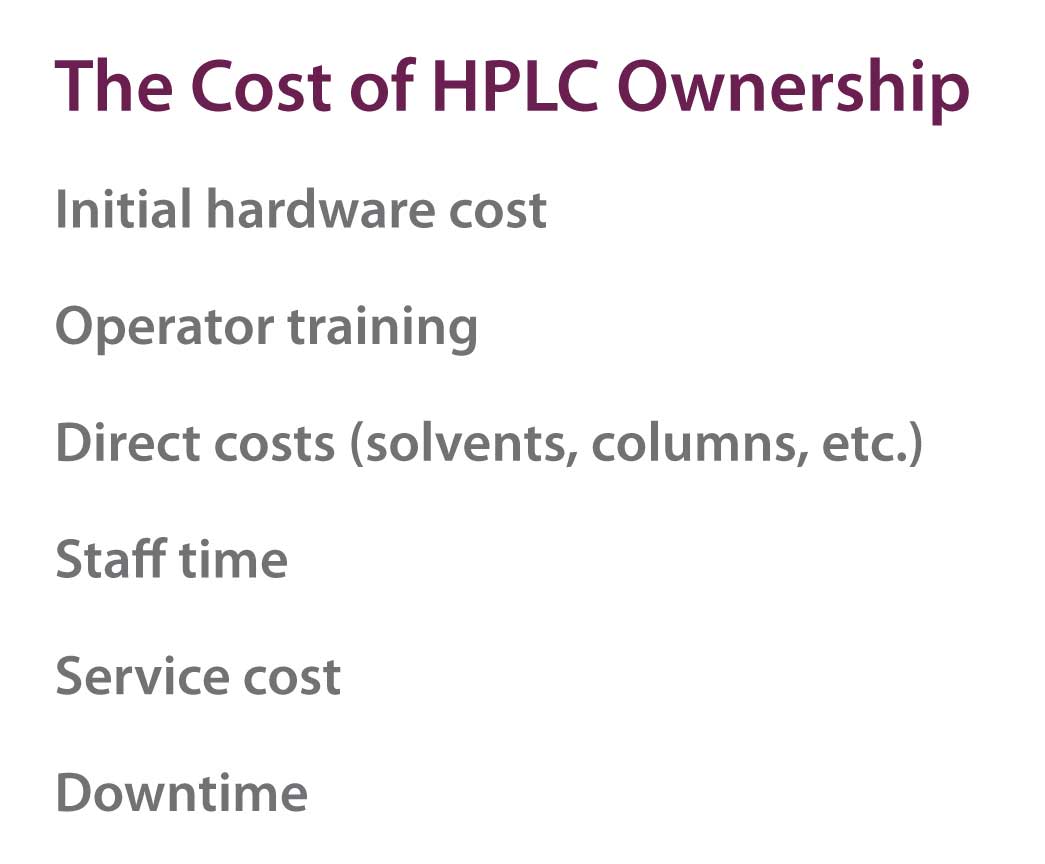John Dolan: I often get asked which HPLC system or manufacturer is the best. In days of yore, there was quite a bit of difference in quality and reliability between instruments sold by different manufacturers, but that is no longer true.
The unreliable systems have fallen by the wayside in a market-driven economy; others have been purchased by other companies. Remember Micromeretics, Altex, Kratos, LDC, or IBM Instruments? Most chromatographers today have never heard of these. Some had fatal flaws and others had clever innovations that made them prime targets for a buy-out. Today nearly any system you can buy will perform adequately for routine analysis. Yes, there are certain demanding applications that may be manufacturer-driven, but this is the exception, not the rule.
There are many costs involved in owning and operating an HPLC system. Some of these are listed in the Figure 1. Several of these are instrument-specific and will vary depending on the brand and model of HPLC instrument you choose. So what is the deciding factor? One variable I encourage you to consider is the level of service you will receive after the sale. You may get all sorts of information on large mean-time-before-failure numbers or promises that “we’ll be there for you” from the sales person. But the cruel fact is that every HPLC system, sooner or later, will need a service call. What is the reputation of the manufacturer’s service staff in your area? Or perhaps there is a 3rd party company that services HPLC systems. In one job, I remember when a service technician moved from one company to the next and our excellent service experience went down the tube. Our next purchase was from the company he moved to. So before the purchase, ask for a list of several local customers that you can talk with, so you can get a realistic idea of the quality of the after-purchase support. Add this information to other factors when you make your purchase decision.
 Figure 1
Figure 1I also encourage you to do at least some of your own service, even if your lab has a service contract on the instrument. For example, servicing the check valves, either by sonication or replacement, is one task that nearly any HPLC operator should be able to perform. If a check valve failure occurs and you have to wait for a service call to correct the problem, it is likely that the service technician will not be able to get to you until the next day, at the earliest. Unless you have another HPLC system sitting idle, it means that your system will not be operable until the next day. Samples may have already been prepared – can they be stored in the refrigerator or must they be re-prepped? Is there sufficient sample to prepare a second batch? How much pressure is there to get the results to your client? Are there other tasks to occupy the staff while you wait for the service call? The list of risks and expenses goes on and on, and in this case, waiting for a service rep to fix a sticky check valve may not be cost-effective.
We had this situation occur in a very real way in our laboratory. When we were just getting started in LC-MS/MS, we had service contracts on all our instruments, as required by the leasing agency. One common failure of the LC-MS electrospray interface (ESI) is that the tip of the spray needle corrodes or gets partially blocked so that the spray cone is distorted and signal is lost. Replacement of the spray needle was included in our service contract. But our lab is in Oregon and the service office was in San Francisco. If the service rep didn’t have anything on his schedule for the next day, he could hop on the first flight to Portland and drive to our lab, arriving by noon, if he was lucky. After a 10-min repair, he could go home again. Not only was this a waste of time for the service rep, it meant that one of our $350,000 LC-MS/MS units was out of service for 24 hr – a much greater expense than the repair itself. We quickly learned how to do the simple repair tasks ourselves and eventually had one of our staff members trained to do all of the routine service and repair of the instruments.
So the next time you think about the factors that go into the purchase of an analytical instrument, consider the quality and speed of service as a major factor.
